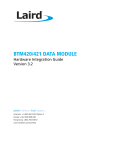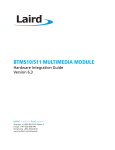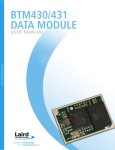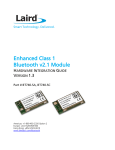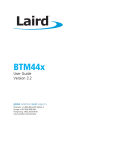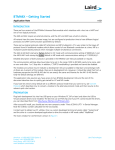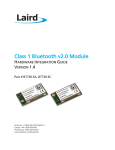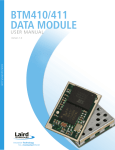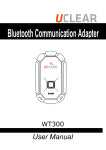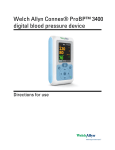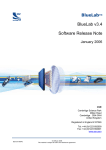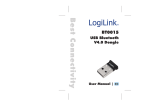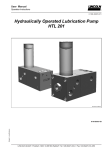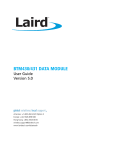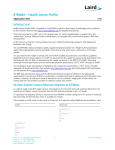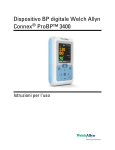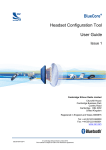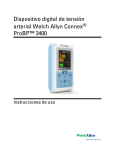Download BTM44x - Laird Technologies
Transcript
BTM44x Hardware Integration Guide Version 3.5 Americas: +1-800-492-2320 Option 2 Europe: +44-1628-858-940 Hong Kong: +852-2923-0610 www.lairdtech.com/wireless BTM44X Hardware Integration Guide Bluetooth® Enhanced Data Module 1 REVISION HISTORY Revision Date Description 1.0 9/10/2011 1.1 04/2012 Up to Build 240 2.0 08/2012 General Formatting 3.0 01/14/2013 Reformatting, Updates to FCC/IC Statements, Updates to Mechanical Specs 3.1 09 Dec 2013 A. Dobbing’s signature added to DoC 3.2 02 Feb 2014 Separated document into two docs: User Guide and Hardware Integration Guide 3.3 06 Feb 2014 Updated Bluetooth SIG Qualification section 3.4 18 Aug 2014 Updated shipping tray image and added module package dimension image. 3.5 3 Sept 2014 Updated EU Declaration of Conformity for BTM441 / BTM443 Initial Release Americas: +1-800-492-2320 Option 2 Europe: +44-1628-858-940 Hong Kong: +852-2923-0610 www.lairdtech.com/bluetooth 2 Laird Technologies BTM44X Hardware Integration Guide Bluetooth® Enhanced Data Module 2 CONTENTS 1 2 3 4 5 6 7 8 9 10 11 12 13 Revision History ................................................................................................................................... 2 Contents ............................................................................................................................................... 3 Product Description............................................................................................................................. 4 3.1 Features and Benefits ........................................................................................................... 4 3.2 Applications .............................................................................................................................. 4 3.3 Bluetooth® Profiles Supported .................................................................................................. 4 Hardware Specifications ..................................................................................................................... 5 4.1 Pin Definitions ........................................................................................................................... 5 4.3 Physical Specifications ............................................................................................................... 7 4.4 Electrical Specifications .............................................................................................................. 7 4.5 Operational Specifications ......................................................................................................... 7 4.6 Voltage Parameters ................................................................................................................... 8 4.7 I/O Details.................................................................................................................................. 9 Mechanical Considerations ............................................................................................................... 10 FCC Regulatory Statements .............................................................................................................. 17 6.1 FCC and Industry Canada Statements ..................................................................................... 17 6.1.1 Considerations for OEM Integration ............................................................................. 17 6.1.3 FCC Labeling requirement............................................................................................ 18 Declarations of Compliance ............................................................................................................. 19 7.1 EU Declaration of Conformity – BTM440 / BTM442 ................................................................. 19 7.1.1 Reference standards used for presumption of conformity: ........................................... 19 7.1.2 Declaration: ................................................................................................................. 19 7.2 EU Declaration of Conformity – BTM441 / BTM443 ................................................................. 20 7.2.1 Reference Standards used for Presumption of Conformity ........................................... 20 7.2.2 Declaration: ................................................................................................................. 20 Bluetooth Approvals ......................................................................................................................... 21 8.1 Subsystem Combinations ........................................................................................................ 21 8.2 Assumptions ........................................................................................................................... 21 8.3 Additional Assistance .............................................................................................................. 22 Ordering Information ....................................................................................................................... 23 Application Note for Surface Mount Modules ............................................................................... 24 10.1 Introduction ............................................................................................................................ 24 10.2 Shipping .................................................................................................................................. 24 10.3 Reflow Parameters .................................................................................................................. 24 References ......................................................................................................................................... 26 Glossary of Terms .............................................................................................................................. 27 Related Documents and Files ........................................................................................................... 28 13.1 Application Notes .................................................................................................................... 28 Americas: +1-800-492-2320 Option 2 Europe: +44-1628-858-940 Hong Kong: +852-2923-0610 www.lairdtech.com/bluetooth 3 Laird Technologies BTM44X Hardware Integration Guide Bluetooth® Enhanced Data Module 3 PRODUCT DESCRIPTION The BTM44x Bluetooth® modules from Laird Technologies have been designed to meet the needs of developers who wish to add robust, short range Bluetooth data connectivity to their products. They are based on the market leading Cambridge Silicon Radio BC04 chipset, providing exceptionally low power consumption with outstanding range. They support the latest Bluetooth® Version 2.1 Specification, providing the important advantage of Secure Simple Pairing, which improves security and enhances the ease of use for end customers. With physical sizes as small as 12.5 x 18.0mm and best of class, low-power operation, these modules are the ideal choice for applications where designers need both performance and minimum size. For maximum flexibility in systems integration, the modules are designed to support a separate power supply for I/O. To aid product development and integration, Laird Technologies has integrated a complete Bluetooth protocol stack within the modules, including support for multiple Bluetooth Profiles. The modules are fully qualified as Bluetooth End Products, allowing designers to integrate them within their own products with no further Bluetooth Qualification. They can then list and promote their products on the Bluetooth website free of charge. Support for Serial Port Profile (SPP), Human Interface Device (HID) profile and Health Device Profile (HDP) are included in the module. The support of the Bluetooth Sig’s Health Device Profile makes this the ideal module for develop pment of Continua compliant medical and wellness devices. By default the Health Device Profile supports the ISO/IEEE 11073-10415 device specialization for weigh scales, but additional specializations for glucose and thermometer are available with more upon request. Communication is available to the module over a serial UART utilizing either a custom Multi-point Packet Protocol API or comprehensive AT commands. Combined with a low cost developer’s kit, this ensures that the choice of Laird Technologies modules guarantees the fastest route to market. 3.1 Features and Benefits Bluetooth® v2.1+EDR Adaptive Frequency Hopping to cope with interference from other wireless devices Secure Simple Pairing support External or internal antenna options Comprehensive AT interface for simple programming Alternate Packet based interface for complex programming Bluetooth® END Product Qualified Compact size Class 2 output – 4dBm Low power operation UART interface Americas: +1-800-492-2320 Option 2 Europe: +44-1628-858-940 Hong Kong: +852-2923-0610 www.lairdtech.com/bluetooth 3.2 Applications Embedded Devices Phone Devices Phone Accessories Security Devices Medical and Wellness Devices Automotive Applications 3.3 Bluetooth® Profiles Supported Serial Port Profile (SPP) Human Interface Device (HID) Profile Host and device supported Health Device Profile (HDP): Agent supported IEEE Device Specialization 11073-10415 (Weight Scale) IEEE Device Specialization 11073 - 10408 (Thermometer) IEEE Device Specialization 11073 – 10417 (Glucose) 4 Laird Technologies BTM44X Hardware Integration Guide Bluetooth® Enhanced Data Module 4 HARDWARE SPECIFICATIONS 4.1 Pin Definitions Table 1: Pin definitions Signal Description Voltage Specification 1 Unused 2 GND 3 UART_CTS Clear to Send I/P VUSB 4 UART_RXD Receive data I/P VUSB 5 UART_RTS Request to Send O/P VUSB 6 UART_TXD Transmit data O/P VUSB 7 GND 8 SPI_CSB SPI bus chip select I/P VIO 9 SPI_MISO SPI bus serial O/P VIO 10 SPI_MOSI SPI bus serial I/P VIO 11 SPI_CLK SPI bus clock I/P VIO 12 VDD_USB USB & UART supply voltage 13 VDD_IO I/O supply voltage 14 VDD_IN Main supply voltage 15 GND 16 PCM_IN PCM Data I/P VIO 17 PCM_SYNC PCM sync I/P VIO 18 PCM_CLK PCM clock I/P VIO 19 PCM_OUT PCM Data O/P VIO 20 RESET Module reset I/P See note 2 21 GPIO4 I/O for host- BT_Active BT_State VIO 22 GPIO2 / UART_DCD I/O for host VIO 23 GND 24 Unused 25 Unused See note 3 26 Unused See note 3 27 Unused See note 3 28 GND See note 3 29 ANT (BTM440 / 442 only) Antenna connection (50 ohm matched) 30 GND See note 3 31 Unused See note 3 32 Unused See note 3 33 Unused See note 3 34 Unused See note 3 Americas: +1-800-492-2320 Option 2 Europe: +44-1628-858-940 Hong Kong: +852-2923-0610 www.lairdtech.com/bluetooth 5 See note 3 Laird Technologies BTM44X Hardware Integration Guide Bluetooth® Enhanced Data Module Signal Description Voltage Specification 35 Unused See note 3 36 Unused See note 3 37 Unused See note 3 38 Unused 39 Unused 40 Unused 41 GND 42 GPIO1 / UART_RI I/O for host VIO 43 GPIO7 / UART_DTR I/O for host VIO 44 GPIO8 / UART_DSR I/O for host VIO 45 GND 46 D- Not used for AT module variants VUSB 47 D+ Not used for AT module variants VUSB 48 GPIO6 I/O for host- RF_Active VIO 49 GPIO5 I/O for host – WLAN_Active VIO 50 GPIO3 I/O for host – BT_Priority VIO Notes: 1. 2. 3. 4. Unused pins may have internal connections and must not be connected. Reset input is active low. Input is pulled up to VDD_IN via 22k. Minimum reset pulse width is 5ms. Pins 25-37 should be left not connected on modules with integrated antenna (BTM441/3) Pins 8 – 11 (SPI related) are only for Laird internal production purposes. Americas: +1-800-492-2320 Option 2 Europe: +44-1628-858-940 Hong Kong: +852-2923-0610 www.lairdtech.com/bluetooth 6 Laird Technologies BTM44X Hardware Integration Guide Bluetooth® Enhanced Data Module 4.3 Physical Specifications Table 2: Physical Specifications Categories Physical Environmental Miscellaneous Feature Implementation Dimensions 12.5mm x 18.0 x 3.4mm (BTM440 / 442) Weight Operating Temperature Storage Temperature Lead free 12.5mm x 24.0mm x 3.4mm (BTM441/3) 12.5mm x 22.0 x 3.4mm (BTM441 / 443) 3 grams -40°C to +85°C -40°C to +85°C Lead-free and RoHS compliant 4.4 Electrical Specifications Table 3: Electrical Specifications Categories Wireless Specification Feature Bluetooth Implementation ® Version 2.1+EDR Transmit Class Class 2 Frequency 2.402 – 2.480 GHz Channels 79 channels Frequency Hopping Adaptive Frequency Hopping Max Transmit Power +4 dBm at antenna pad (BTM440/2) +4 dBmi from integrated antenna (BTM441/3) Min Transmit Power -27 dBm at antenna pad (BTM440/2) -27 dBmi from integrated antenna (BTM441/3) Receive Sensitivity -84 dBm Range 30 m Data Transfer Rate Up to 350 kbps 4.5 Operational Specifications Table 4: Operational Specifiations Recommended Operating Conditions OPERATING CONDITIONS VDD_USB (USB compatibility not required) VDD_USB (USB compatibility required) VDD_IO VDD_IN Americas: +1-800-492-2320 Option 2 Europe: +44-1628-858-940 Hong Kong: +852-2923-0610 www.lairdtech.com/bluetooth 7 MIN MAX 1.7 3.6 3.1 3.6 1.7 3.0 3.3 3.3 Laird Technologies BTM44X Hardware Integration Guide Bluetooth® Enhanced Data Module 4.6 Voltage Parameters Table 5: Voltage Parameters (VUSB) Logic Levels (VUSB) INPUT VOLTAGE LEVELS MIN Vih 0.7VDD_USB Vil 2.7<VDD_USB<3.0 1.7<VDD_USB<1.9 TYP MAX -0.4 +0.8 -0.4 +0.4 OUTPUT VOLTAGE LEVELS (1.7<VDD_USB<1.9) Voh (Iout = -4mA) VDD_USB – 0.4 0.4 Vol (Iout = 4mA) OUTPUT VOLTAGE LEVELS (2.7<VDD_USB<3.0) Voh (Iout = -4mA) VDD_USB – 0.2 0.2 Vol (Iout = 4mA) Note: VDD_USB must be connected to power the USB and UART interfaces. Table 6: Voltage Parameters (VIO) Logic Levels (VIO) INPUT VOLTAGE LEVELS Vih Vil 2.7<VDD_IO<3.0 1.7<VDD_IO<1.9 MIN TYP MAX 0.7VDD_IO -0.4 +0.8 -0.4 +0.4 OUTPUT VOLTAGE LEVELS (1.7 < VDD_IO < 1.9) Voh (Iout = -4mA) VDD_IO – 0.4 0.4 Vol (Iout = 4mA) OUTPUT VOLTAGE LEVELS (2.7 < VDD_IO < 3.0) Voh (Iout = -4mA) VDD_IO – 0.2 0.2 Vol (Iout = 4mA) Americas: +1-800-492-2320 Option 2 Europe: +44-1628-858-940 Hong Kong: +852-2923-0610 www.lairdtech.com/bluetooth 8 Laird Technologies BTM44X Hardware Integration Guide Bluetooth® Enhanced Data Module 4.7 I/O Details Table 7: I/O Details Categories Feature Implementation Command Interface AT Instructions set Comprehensive control of connection and module operation S Registers for non-volatile storage of parameters UART Interface Baud Rate AT Mode Default Baud Rate: 9600 bps MP Mode Default Baud Rate: 115,200 bps Supply Voltage Supply 3.0V – 3.3V DC I/O 1.7V – 3.3V DC (independent of Supply) USB & UART 1.7V – 3.6V DC (independent of Supply) Coexistence / Compatibility WLAN (802.11) 2-wire and 3-wire hardware coexistence schemes supported Connections Interface Surface Mount Pads External Antenna (BTM440/2) Pad for 50 Ohm antenna Bluetooth Qualified as an END product FCC Limited Modular Approval (BTM440/2) Full Modular Approval (BTM441/3) Industry Canada (IC) Limited Modular Approval (BTM440/2) Full Modular Approval (BTM441/3) CE & R&TTE Meets CE and R&TTE requirements Lead free Lead-free and RoHS compliant Warranty 12 Months Development Kit Development board and software tools DVK-BTM440/2 Dev Kit with BTM440/2 module fitted DVK-BTM441/3 Dev Kit with BTM441/3 module fitted Approvals Miscellaneous Development Tools Americas: +1-800-492-2320 Option 2 Europe: +44-1628-858-940 Hong Kong: +852-2923-0610 www.lairdtech.com/bluetooth 9 Laird Technologies BTM44X Hardware Integration Guide Bluetooth® Enhanced Data Module 5 MECHANICAL CONSIDERATIONS Mechanical Layout - BTM440/442 Mechanical Details Module Keep-Out Area:An area of 1.5mm around the module should be reserved as a keep-out area. No other components should be placed in this area. Note: Development Kit Schematics for this product can be accessed from the following link: DVK Schematics – BTM44x Americas: +1-800-492-2320 Option 2 Europe: +44-1628-858-940 Hong Kong: +852-2923-0610 www.lairdtech.com/bluetooth 10 Laird Technologies BTM44X Hardware Integration Guide Bluetooth® Enhanced Data Module Mechanical layout - BTM440/442 Mechanical Details Module Keep-Out Area:An area of 1.5mm around the module should be reserved as a keep-out area. No other components should be placed in this area. Note: Development Kit Schematics for this product can be accessed from the following link: DVK Schematics – BTM44x Americas: +1-800-492-2320 Option 2 Europe: +44-1628-858-940 Hong Kong: +852-2923-0610 www.lairdtech.com/bluetooth 11 Laird Technologies BTM44X Hardware Integration Guide Bluetooth® Enhanced Data Module Mechanical layout - BTM440/442 Mechanical Details WARNING: Test point dimensions are for reference only. DO NOT make electrical connections to these test points, this will void the warranty. Laird does not recommend routing on the top layer underneath the module. Americas: +1-800-492-2320 Option 2 Europe: +44-1628-858-940 Hong Kong: +852-2923-0610 www.lairdtech.com/bluetooth 12 Laird Technologies BTM44X Hardware Integration Guide Bluetooth® Enhanced Data Module Mechanical layout - BTM441/443 Mechanical Details Module Keep-Out Area:An area of 1.5mm around the module should be reserved as a keep-out area. No other components should be placed in this area. Note: Development Kit Schematics for this product can be accessed from the following link: DVK Schematics – BTM44x Americas: +1-800-492-2320 Option 2 Europe: +44-1628-858-940 Hong Kong: +852-2923-0610 www.lairdtech.com/bluetooth 13 Laird Technologies BTM44X Hardware Integration Guide Bluetooth® Enhanced Data Module Mechanical layout - BTM441/443 Mechanical Details Module Keep-Out Area:An area of 1.5mm around the module should be reserved as a keep-out area. No other components should be placed in this area. Note: Development Kit Schematics for this product can be accessed from the following link: DVK Schematics – BTM44x Americas: +1-800-492-2320 Option 2 Europe: +44-1628-858-940 Hong Kong: +852-2923-0610 www.lairdtech.com/bluetooth 14 Laird Technologies BTM44X Hardware Integration Guide Bluetooth® Enhanced Data Module Mechanical layout - BTM441/443 Mechanical Details Americas: +1-800-492-2320 Option 2 Europe: +44-1628-858-940 Hong Kong: +852-2923-0610 www.lairdtech.com/bluetooth 15 Laird Technologies BTM44X Hardware Integration Guide Bluetooth® Enhanced Data Module Mechanical layout - BTM441/443 Mechanical Details WARNING: Test point dimensions are for reference only. DO NOT make electrical connections to these test points, this will void the warranty. Laird does not recommend routing on the top layer underneath the module. Americas: +1-800-492-2320 Option 2 Europe: +44-1628-858-940 Hong Kong: +852-2923-0610 www.lairdtech.com/bluetooth 16 Laird Technologies BTM44X Hardware Integration Guide Bluetooth® Enhanced Data Module 6 FCC REGULATORY STATEMENTS 6.1 FCC and Industry Canada Statements The OEM’s final equipment user manual must show the following statement: This device complies with part 15 of the FCC Rules. Operation is subject to the following two conditions: (1) This device may not cause harmful interference, and (2) this device must accept any interference received, including interference that may cause undesired operation. 6.1.1 Considerations for OEM Integration Changes or modifications not expressly approved by Laird Technologies could void the user’s authority to operate the equipment. Designers should note the distinction that the FCC makes regarding portable and mobile devices. Mobile devices are defined as products that are not used closer than 20cm to the human body, whereas portable devices can be used closer that 20cm to the body. A device may be used in portable exposure conditions with no restrictions on host platforms when the averaged output power is less than the low power threshold for an uncontrolled environment ≤ 60/f(GHz) i.e. 25mW for a 2.4Ghz device. The Maximum Power Exposure for the BTM44x has been evaluated and found to comply with the low power threshold for an uncontrolled environment. Refer to FCC document KDB 447498 for more information on RF exposure procedures and equipment authorization policies for mobile and portable devices. The BTM44x comply with the FCC RF radiation exposure limits set forth for an uncontrolled environment. This device and its antenna must not be co-located or operating in conjunction with any other antenna or transmitter except in accordance with FCC multi-transmitter product procedures. These procedures could require RF exposure evaluation to be re-evaluated on the complete product. The installer of the this module into host equipment must ensure his equipment complies with the FCC RF Exposure requirements set forth in 47 CFR 2.1091 or 2.1093 The BTM44x comply with the RSS-102RF radiation exposure limits set forth for an uncontrolled environment. If this device and its antenna is co-located or operating in conjunction with any other antenna or transmitter RF exposure evaluation should be re-evaluated on the complete product by a qualified test house. The installer of this module into host equipment must ensure his equipment complies with the Industry Canada RSS-102 RF Exposure requirements. BTM440 / BTM442 These modules hold a limited modular approval. Approval with any other antenna configuration or layout other than that approved will necessitate additional radiated emission testing to be performed. The modules were approved with the following antenna: RF Solutions: ANT-24G-WHJ-SMA 0dBi Americas: +1-800-492-2320 Option 2 Europe: +44-1628-858-940 Hong Kong: +852-2923-0610 www.lairdtech.com/bluetooth 17 Laird Technologies BTM44X Hardware Integration Guide Bluetooth® Enhanced Data Module 6.1.3 FCC Labeling requirement 6.1.3.1 BTM440 / BTM442 If the FCC ID is not visible when the module is installed inside another device, then the outside of the device into which the module is installed must also display a label referring to the enclosed module. This exterior label can use wording such as the following: “Contains Transmitter Module FCC ID: PI4410B” or “Contains FCC ID: PI4410B”. Any similar wording that expresses the same meaning may be used. 6.1.3.2 BTM441 / BTM443 If the FCC ID is not visible when the module is installed inside another device, then the outside of the device into which the module is installed must also display a label referring to the enclosed module. This exterior label can use wording such as the following: “Contains Transmitter Module FCC ID: PI4411B” or “Contains FCC ID: PI4411B.” Any similar wording that expresses the same meaning may be used. Americas: +1-800-492-2320 Option 2 Europe: +44-1628-858-940 Hong Kong: +852-2923-0610 www.lairdtech.com/bluetooth 18 Laird Technologies BTM44X Hardware Integration Guide Bluetooth® Enhanced Data Module 7 DECLARATIONS OF COMPLIANCE 7.1 EU Declaration of Conformity – BTM440 / BTM442 Manufacturer: Laird Technologies Product: BTM440/2 EU Directive: RTTE 1995/5/EC Conformity Assessment: Annex IV 7.1.1 Reference standards used for presumption of conformity: Article Number: 3.1a 3.1b 3.2 Requirement Reference standard(s): Health and Safety EN 60950-1:2006 Protection requirements with respect to electromagnetic Compatibility EN 301 489-1 V1.8.1 EN 301 489-17 2.1.1 Emissions: EN55022:2006/A1:2000/A2:2006(ClassB) Immunity: EN61000-4-2:1995/A1:1998/A2:2001 EN61000-4-3:2002/A1:2002 Means of the efficient use of the radio frequency spectrum EN 300 328 V1.7.1 (2006-10) 7.1.2 Declaration: We, Ezurio Ltd, declare under our sole responsibility that the essential radio test suites have been carried out and that the above product to which this declaration relates is in conformity with all the applicable essential requirements of Article 3 of the EU Directive 1995/5/EC, when used for its intended purpose. Place of Issue: Date of Issue: Name of Authorised Person: Signature: Americas: +1-800-492-2320 Option 2 Europe: +44-1628-858-940 Hong Kong: +852-2923-0610 www.lairdtech.com/bluetooth Ezurio Ltd dba Laird Technologies Saturn House, Mercury Park Wooburn Green HP100HH, United Kingdom tel: +44 (0)1628 858 940 fax: +44 (0)1628 528 382 October 2009 Andrew Dobbing, Engineering Manager 19 Laird Technologies BTM44X Hardware Integration Guide Bluetooth® Enhanced Data Module 7.2 EU Declaration of Conformity – BTM441 / BTM443 Manufacturer: Laird Product: BTM410 / BTM411 / BTM420 / BTM421 / BTM430 / BTM431 / BTM441 / BTM443 / BTM461 EU Directive: RTTE 1995/5/EC Conformity Assessment: Annex IV 7.2.1 Reference Standards used for Presumption of Conformity Article Number Requirement Reference standard(s) 3.1a Health and Safety EN 60950-1:2005 (2nd Ed); +Am1:2009 +Am2:2013 EN 60950-1:2006+A11+a1:2010+A12:2011+A2:2013 3.1a RF Exposure EN 62479:2010 3.1b Protection requirements with EN 301 489-1 V1.9.2 (2011-09) respect to electromagnetic EN 301 489-17 V2.2.1 (2012-09) compatibility Emissions: EN55022:2010 /AC:2011 (ClassB) Immunity: EN61000-4-2:2009 EN61000-4-3:2006 /A1:2008 /A2:2010 3.2 Means of the efficient use of EN 300 328 V1.8.1 (2012-06) the radio frequency spectrum 7.2.2 Declaration: We, Laird, declare under our sole responsibility that the essential radio test suites have been carried out and that the above product to which this declaration relates is in conformity with all the applicable essential requirements of Article 3 of the EU Directive 1995/5/EC, when used for its intended purpose. Place of Issue: Laird 11160 Thompson Ave. Lenexa, KS 66219 Date of Issue: October 2009 Name of Authorized Person: Daniel Waters / Certifications Specialist Signature: Americas: +1-800-492-2320 Option 2 Europe: +44-1628-858-940 Hong Kong: +852-2923-0610 www.lairdtech.com/bluetooth 20 Laird Technologies BTM44X Hardware Integration Guide Bluetooth® Enhanced Data Module 8 BLUETOOTH APPROVALS 8.1 Subsystem Combinations This application note covers the procedure for generating a new Declaration ID for a Subsystem combination on the Bluetooth SIG website. In the instance of subsystems, a member can combine two or more subsystems to create a complete Bluetooth End Product solution. Subsystem listings referenced as an example: Design Name Owner Declaration ID Link to listing on the SIG website BTM44x Laird B016072 https://www.bluetooth.org/tpg/QLI_viewQDL.cfm?qid=16072 Interface Express subsystem Cambridge Consultants Ltd B017578 https://www.bluetooth.org/tpg/QLI_viewQDL.cfm?qid=17578 8.2 Assumptions This procedure assumes that the member is simply combining two subsystems to create a new design, without any modification to the existing, qualified subsystems. This is achieved by using the Listing interface on the Bluetooth SIG website. Figure 1 shows the basic subsystem combination of a controller and host subsystem. The Controller provides the RF/BB/LM and HCI layers, with the Host providing L2CAP, SDP, GAP, RFCOMM/SPP and any other specific protocols and profiles existing in the Host subsystem listing. The design may also include a Profile Subsystem. Figure 1: Basic subsystem combination of a controller and host subsystem Americas: +1-800-492-2320 Option 2 Europe: +44-1628-858-940 Hong Kong: +852-2923-0610 www.lairdtech.com/bluetooth 21 Laird Technologies BTM44X Hardware Integration Guide Bluetooth® Enhanced Data Module The Qualification Process requires each company to registered as a member of the Bluetooth SIG – www.bluetooth.org The following link provides a link to the Bluetooth Registration page: https://www.bluetooth.org/login/register/ For each Bluetooth Design it is necessary to purchase a Declaration ID. This can be done before starting the new qualification, either through invoicing or credit card payment. The fees for the Declaration ID depend on your membership status, please refer to the following webpage: https://www.bluetooth.org/en-us/test-qualification/qualification-overview/fees For a detailed procedure of how to obtain a new Declaration ID for your design, please refer to the following SIG document: https://www.bluetooth.org/DocMan/handlers/DownloadDoc.ashx?doc_id=283698&vId=317486 To start the listing, go to: https://www.bluetooth.org/tpg/QLI_SDoc.cfm In step 1, select Reference a Qualified Design and enter the Declaration IDs of each subsystem used in the End Product design. You can then select your pre-paid Declaration ID from the drop down menu or go to the Purchase Declaration ID page, (please note that unless the Declaration ID is pre-paid or purchased with a credit card, it will not be possible to proceed until the SIG invoice is paid. Once all the relevant sections of step 1 are finished, complete steps 2, 3, and 4 as described in the help document. Your new Design will be listed on the SIG website and you can print your Certificate and DoC. For further information please refer to the following training material: https://www.bluetooth.org/en-us/test-qualification/qualification-overview/listing-process-updates 8.3 Additional Assistance Please contact your local sales representative or our support team for further assistance: Laird Technologies Connectivity Products Business Unit Support Centre: http://ews-support.lairdtech.com Email: [email protected] Phone: Americas: +1-800-492-2320 Option 2 Europe: +44-1628-858-940 Hong Kong: +852 2923 0610 Web: http://www.lairdtech.com/bluetooth Americas: +1-800-492-2320 Option 2 Europe: +44-1628-858-940 Hong Kong: +852-2923-0610 www.lairdtech.com/bluetooth 22 Laird Technologies BTM44X Hardware Integration Guide Bluetooth® Enhanced Data Module 9 ORDERING INFORMATION Part Number Description BTM440 Bluetooth MP Data Module (external antenna) BTM441 Bluetooth MP Data Module (with integrated antenna) BTM442 Bluetooth AT Data Module (external antenna) BTM443 Bluetooth AT Data Module (with integrated antenna) DVK – BTM440 Development board with BTM440 module soldered in place DVK – BTM442 Development board with BTM442 module soldered in place Americas: +1-800-492-2320 Option 2 Europe: +44-1628-858-940 Hong Kong: +852-2923-0610 www.lairdtech.com/bluetooth 23 Laird Technologies BTM44X Hardware Integration Guide Bluetooth® Enhanced Data Module 10 APPLICATION NOTE FOR SURFACE MOUNT MODULES 10.1 Introduction Laird Technologies surface mount modules are designed to conform to all major manufacturing guidelines. This application note is intended to provide additional guidance beyond the information that is presented in the User Manual. This Application Note is considered a living document and will be updated as new information is presented. The modules are designed to meet the needs of several commercial and industrial applications. The modules are designed to be easily manufactured and conform to current automated manufacturing processes. 10.2 Shipping Modules are shipped in ESD (Electrostatic Discharge) safe trays that can be loaded into most manufacturers pick and place machines. Layouts of the trays are provided in Figures 8 and 9. Figure 8: BTM44x Shipping Tray Details 10.3 Reflow Parameters Laird Technologies surface mount modules are designed to be easily manufactured including reflow soldering to a PCB. Ultimately it is the responsibility of the customer to choose the appropriate solder paste and to Americas: +1-800-492-2320 Option 2 Europe: +44-1628-858-940 Hong Kong: +852-2923-0610 www.lairdtech.com/bluetooth 24 Laird Technologies BTM44X Hardware Integration Guide Bluetooth® Enhanced Data Module ensure oven temperatures during reflow meet the requirements of the solder paste. Laird Technologies’ surface mount modules conform to J-STD-020D1 standards for reflow temperatures. IMPORTANT: During reflow, modules should not be above 260°C and not for more than 30 Figure 10: Recommended Reflow Temperature Temperatures should not exceed the minimums or maximums presented in Table 21. Table 8: Recommended Maximum and minimum temperatures Recommended Max & Min's Specification Temperature Inc./Dec. Rate (max) Value 3 Unit °C / Sec Temperature Decrease rate (goal) 2-3 °C / Sec Soak Temp Increase rate (goal) .5 - 1 °C / Sec Flux Soak Period (Min) 60 Sec Flux Soak Period (Max) 90 Sec Flux Soak Temp (Min) 150 °C Flux Soak Temp (max) 190 °C Time Above Liquidous (max) 60 Sec Time Above Liquidous (min) 20 Sec Time In Target Reflow Range (goal) 30 Sec Time At Absolute Peak (max) 30 Sec Liquidous Temperature (SAC305) 217 °C Lower Target Reflow Temperature 225 °C Upper Target Reflow Temperature 250 °C Absolute Peak Temperature 260 °C Americas: +1-800-492-2320 Option 2 Europe: +44-1628-858-940 Hong Kong: +852-2923-0610 www.lairdtech.com/bluetooth 25 Laird Technologies BTM44X Hardware Integration Guide Bluetooth® Enhanced Data Module 11 REFERENCES [1] “Bluetooth Specification Version 2.1 + EDR [vol3]”, 26 July 2007 http://www.bluetooth.com/Bluetooth/Technology/Building/Specifications/ (click on “Core Specification v2.1 + EDR”) [2] “Serial Port Profile“ Specification http://www.bluetooth.com/Bluetooth/Technology/Works/SPP.htm (link at the bottom of page “Need more? View the Serial Port Profile (SPP)”) [3] “Bluetooth Assigned Numbers” http://www.bluetooth.com/Bluetooth/Technology/Building/Specifications/ select “Items per page: ALL”, go to end of page, there click on “Assigned Numbers – Baseband”, for a complete list of Profile UUIDs: click on “Assigned Numbers – Service Discovery” [4] Class of Device Generator: this link might be helpful for creating a particular CoD http://bluetooth-pentest.narod.ru/software/bluetooth_class_of_device-service_generator.html Caution: this tool allows selection of more than one minor device classes, so make sure that only one minor device class is select and verify the result with [3] anyway. [5] “Bluecore 4 External” Data Sheet, Cambridge Silicon Radio (CSR) http://www.csrsupport.com (log in or new account required) [6] “Winbond 681360 Codec Board User Guide”, Ezurio Application Note [7] “BTM44x AppNote: Getting Started” [8] “BTM44x AppNote: Firmware Upgrade” [9] “BTM44x AppNote: Throughput Analysis” [10] “BTM44x AppNote: Health Device Profile” [11] “BTM44x AppNote: Latency Optimization” [12] “BTM44x AppNote: RF Testing” Americas: +1-800-492-2320 Option 2 Europe: +44-1628-858-940 Hong Kong: +852-2923-0610 www.lairdtech.com/bluetooth 26 Laird Technologies BTM44X Hardware Integration Guide Bluetooth® Enhanced Data Module 12 GLOSSARY OF TERMS Term Description A2DP : Advanced Audio Distribution Profile ACL : Asynchronous Connection-Oriented Link ADC : Analogue to Digital Converter AGHFP : Audio Gateway Hands-Free Profile AT : Command prefix, ‘Attention’ AVRCP : Audio/Video Remote Control Profile BISM : Bluetooth Intelligent Serial Module CoD : Class Of Device (also referred to as “device class”) Codec : Device capable of encoding / decoding an analogue / digital signal DAC : Digital to Analogue Converter DSP : Digital Signal Processor DUN : Dial-Up Network Profile EIR : Extended Inquiry Response eSCO : Enhanced Synchronous Connection Oriented Link (used for Audio) FTP : File Transfer Profile GOEP : Generic Object Access Exchange Profile GPIO : General Purpose Input Output HF : Hands-free Role of Hands-free Profile (“Hands-free Unit”) HFG : Audio Gateway Role of Hands-free Profile (“Hands-free Gateway”) HFP : Hands Free Profile HID : Human Interface Device Profile HS : Headset Role of Headset Profile (“Headset”) HSG : Audio Gateway Role of Headset Profile (“Headset Gateway”) HSP : Headset Profile I/O (IO) : Input/Output Mic : Microphone MITM : Man In The Middle OPP : Object Push Profile PBAP : Phone Book Access Profile PT : PASS THROUGH Command PWM : Pulse Width Modulation SBC : Sub Band Codec SCO : Synchronous Connection Oriented Link (used for Audio) Americas: +1-800-492-2320 Option 2 Europe: +44-1628-858-940 Hong Kong: +852-2923-0610 www.lairdtech.com/bluetooth 27 Laird Technologies BTM44X Hardware Integration Guide Bluetooth® Enhanced Data Module Term Description SLC : Service Level Connection SPP : Serial Port Profile SSO : Serial Stream Oriented SSP : Secure Simple Pairing SUI : SUBUNIT INFO Command Sxxx : S-Register No. xxx TDL : Trusted Device List UART : Universal Asynchronous Receiver / Transmitter UI : UNIT INFO Command 13 RELATED DOCUMENTS AND FILES The following additional BTM44x technical documents are also available from the Laird BTM44x product page under the Documentation tab: Product Brief User Manual Firmware Release Notes Development Kit Schematics 13.1 Application Notes Getting Started Firmware Upgrade Throughput Analysis Health Device Profile Latency Optimization RF Testing Americas: +1-800-492-2320 Option 2 Europe: +44-1628-858-940 Hong Kong: +852-2923-0610 www.lairdtech.com/bluetooth 28 Laird Technologies BTM44X Hardware Integration Guide Bluetooth® Enhanced Data Module Laird Technologies is the world leader in the design and manufacture of customized, performance-critical products for wireless and other advanced electronics applications. Laird Technologies partners with its customers to find solutions for applications in various industries such as: Network Equipment Telecommunications Data Communications Automotive Electronics Computers Aerospace Military Medical Equipment Consumer Electronics Laird Technologies offers its customers unique product solutions, dedication to research and development, as well as a seamless network of manufacturing and customer support facilities across the globe. CONN-HIG-BTM44x Copyright © 2014 Laird Technologies, Inc. All rights reserved. The information contained in this manual and the accompanying software programs are copyrighted and all rights are reserved by Laird Technologies, Inc. Laird Technologies, Inc. reserves the right to make periodic modifications of this product without obligation to notify any person or entity of such revision. Copying, duplicating, selling, or otherwise distributing any part of this product or accompanying documentation/software without the prior consent of an authorized representative of Laird Technologies, Inc. is strictly prohibited. All brands and product names in this publication are registered trademarks or trademarks of their respective holders. This material is preliminary Information furnished by Laird Technologies in this specification is believed to be accurate. Devices sold by Laird Technologies are covered by the warranty and patent indemnification provisions appearing in its Terms of Sale only. Laird Technologies makes no warranty, express, statutory, and implied or by description, regarding the information set forth herein. Laird Technologies reserves the right to change specifications at any time and without notice. Laird Technologies’ products are intended for use in normal commercial and industrial applications. Applications requiring unusual environmental requirements such as military, medical life-support or life-sustaining equipment are specifically not recommended without additional testing for such application. Limited Warranty, Disclaimer, Limitation of Liability Americas: +1-800-492-2320 Option 2 Europe: +44-1628-858-940 Hong Kong: +852-2923-0610 www.lairdtech.com/bluetooth 29 Laird Technologies































